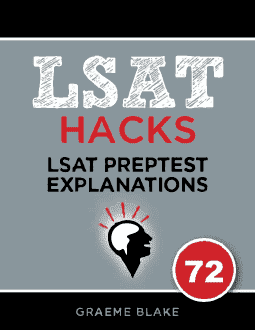QUESTION TEXT: Neuroscientists subjected volunteers with amusia…
QUESTION TYPE: Most Strongly Supported
FACTS:
- Volunteers had amusia – difficulty remembering tunes and telling melodies apart.
- The volunteers heard shifts in pitch as big as the difference between piano keys.
- The volunteers couldn’t tell the pitches apart.
- But the volunteers were able to track timing well.
ANALYSIS: I’m going to summarize this information further. We know three things about those who have amusia:
- They can’t tell songs apart
- They can’t tell pitch
- They can tell timing.
This only really supports one idea: amusia is more likely to be caused by lack of pitch judgment than lack of timing judgement. This is true because those with amusia seem to be able to track musical time!
___________
- There are two problems. First, we don’t know if the volunteers had a highly developed sense of timing. We just know they could track timing – maybe everyone can do that. Second, we don’t know if their latch of pitch recognition is what caused the volunteers to be good at timing.
- CORRECT. This is well supported. We know three things: The volunteers had amusia, they suck at pitch, they’re fine with timing.
- Read the final sentence carefully. It never said the subjects could tell the pitch of the song. We have no evidence that subjects with amusia can ever discern timing.
- This isn’t supported. We do know that people with amusia can’t tell melodies apart, yet their timing is fine. But perhaps someone who had no sense of timing also would be unable to tell melodies apart, even if they didn’t have amusia.
- We don’t know why the subjects with amusia could judge timing. Maybe they learned it, sure, but it’s possible they were born with it.


What bothers me is that Amusia probably “results” from some physical factors. The inability to discern pitch is presumably a symptom of Amusia, as opposed to a cause. Maybe that’s too much of an assumption I’m bringing to the question, but saying that a certain condition manifested by x ability/disability is a “result” of that disability seems bizarre to me.
I agree that the wording of the answer choice is too strong — to say amusia “results from” either inability (based on the information we’re provided in the stimulus) is stronger wording than we normally see on the LSAT. After all, the link between amusia (as it’s defined in the stimulus) and an inability to discern tones might just be correlative.
I’d still justify this answer over the other four, which are entirely unsupported by the stimulus, by saying that that the two essential components of melody are pitch and timing. So, it’s reasonable to assume that if you have difficulty telling melodies apart and that the problem isn’t tracking timing, it’s more likely that your difficulty stems from issues with pitch discernment.
But this says Amusia RESULTS, which confused me a little. What if Amusia causes people to be unable to tell tones apart rather than telling tones apart results in Amusia? Am I missing something here when I interpret the word results as I am?
Amusia is being unable to tell melodies apart. This could be from an inability to tell tones apart, or a timing problem.
The stimulus implies that the problem is tone, not timing. Words like “amusia” are just names we give to conditions. A word can’t cause anything. In practice, we use Amusia as shorthand for “can’t tell melodies apart”, and this stimulus shows that the source of that shortfall is a shortfall in telling tones apart.